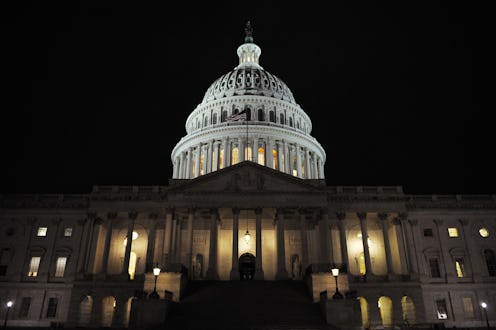News
Why Democrats Won't Take The House
Even though the future looks bright for Democrats , at least in comparison to their Republican counterparts — you know, their party is intact and hasn't imploded beyond recognition, their presidential candidate will likely win, and the nominee hasn't made a complete mockery of the establishment — the up ticket might get upstaged by some of the losses in the down ticket. As of late October, it looks like Democrats won't take the House as they'd once hoped to do.
Particularly after the endless scandals from Republican presidential nominee Donald Trump, some Dems speculated that it would make for a clean sweep across the board. Right now, even speaking conservatively, it looks like Dems will win the presidency and are in the running to possibly take the Senate. At the same time, though, they would be getting ahead of themselves to think they'd be within spitting distance of the 30 seats they need to take back Congress, and there's one main reason why: redistricting.
In a Wall Street Journal op-ed six years ago, political strategist Karl Rove spells out the master plan. It's something pols have been hyper-aware of for decades, but in 2010 Republicans capitalized on the tactic in a major way:
Control of the state legislature matters whether a state loses or gains seats. ... Republicans won control of the Texas House in 2002 and redrew the state's congressional map. As a result, the GOP now controls 20 congressional seats in Texas while Democrats control 12. ... To understand the broader political implications, consider that the GOP gained somewhere between 25 and 30 seats because of the redistricting that followed the 1990 census. Without those seats, Republicans would not have won the House in 1994.
As Rove points out, redistricting specifically revolves around census years and won't be up for a change until the next presidential cycle in 2020. Most importantly, this gerrymandering means that minorities get spread out and don't have the voting pull in their districts they need to be truly represented. It's especially impactful since the technology to take advantage of micro-targeting certain demos in specific voting areas is continuously improving.
Now, the Black Caucus is stepping in, urging Clinton to focus her campaign dollars on encouraging black voters to vote, suggesting it could be the way to battle the brick wall that is the 2010 redistricting. And it could be money well-spent — as Rove further outlines in his WSJ op-ed, these little lines on a map end up amounting to a lot of cash:
Control of redistricting also has huge financial implications. The average winner of a competitive House race in 2008 spent $2 million, while a noncompetitive seat can be defended for far less than half that amount. Moving, say, 20 districts from competitive to out-of-reach could save a party $100 million or more over the course of a decade.
Either way, control of the House affects the ticket from top to bottom — it'll have an impact on how much the next president will be able to get done.
